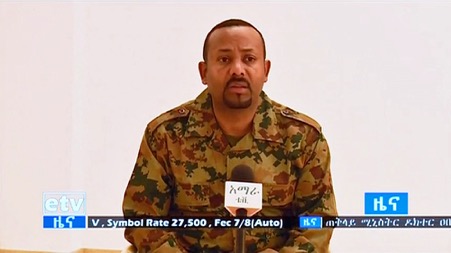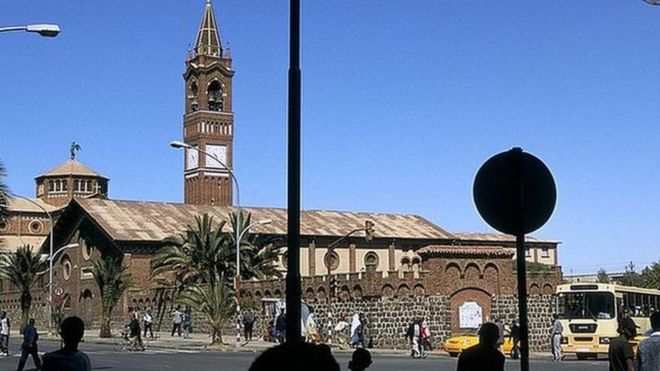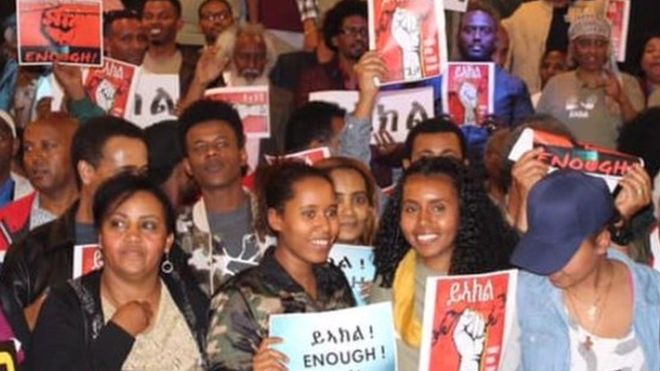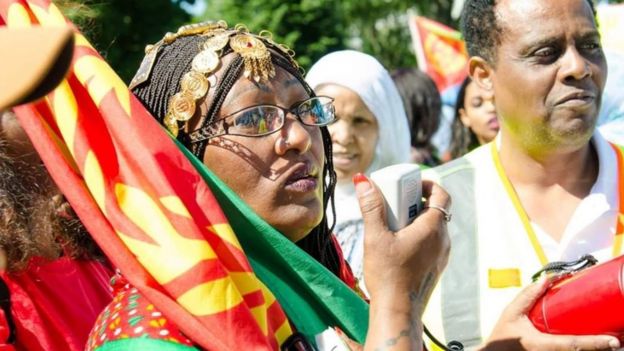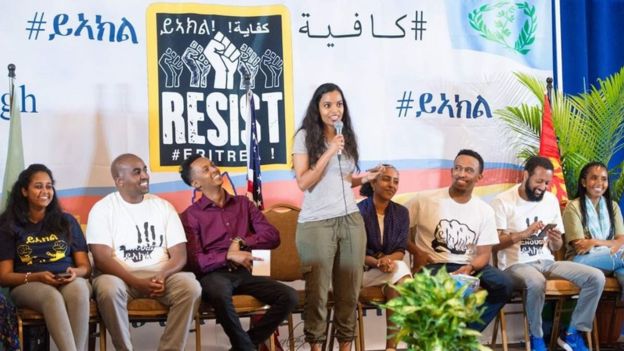This week has seen a remarkable gathering in the German city of Dortmund, where the Protestant churches considered a range of topics – including migration.

The discussions took place against a terrible background: the rise of far-right violence that led to the murder of German politician Walter Lübcke. Chancellor Angela Merkel says Germany must rigorously fight rightwing extremism. The chancellor, speaking at the Dortmund annual meeting of Protestant churches, said rightwing extremism must be fought “without any taboo”.
But the Dortmund gathering also looked beyond Europe. The meeting heard from Germany’s Minister of State in the Foreign Office, Niels Annen, as part of a panel on the subject of migration and refugees.
Below is the panel on which Mr Annen spoke and then the presentation by Professor Mirjam van Reisen, followed by an example of the tragic consequences of the EU’s attempts to keep African refugees from Europe’s shores.
African and European views on better migration Focus on migration, integration, recognition
- What is better migration? Niels Annen, MP, minister of state, German Federal Foreign Office, Berlin
- What is the African view on the Khartoum Process? Dr. Mehari T. Maru, AU-IGAD Chief Strategist
- The impact of EU migration policy on the local population in East Africa. Dr. Albaqir Alafif Mukhtar, director, Al-Khatim Adlan Center for Enlightenment, Khartoum, Sudan
- The Bankrupcy of the Khartoum Process. Prof. Dr. Mirjam van Reisen, International Relations, Innovation and Care, Tilburg, Netherlands
- Panel discussion with the speakers Moderation: Marina Peter, Bread for the World – Protestant Development Service, Berlin
- Spokespersons for the audience: Kirsten Mittmann, Bremen Christian Reiser, Berlin
- Music: Sauti Ya Ushindi, Malula, Tanzania
Presentation Kirchentag 2019
Prof Dr Mirjam van Reisen
Tilburg/Leiden University
22 June 2019
On 3 October 2013 a terrible disaster happened. A boat caught fire, just before the coast of Lampedusa and sank. Many of the 600 people on the boat died, especially the women and children who had been sleeping below deck. There were terrible, terrible stories, among which the story of a young pregnant woman who delivered her baby as she drowned. Her husband, who had been on the deck, survived the tragedy and had to bury his wife and his newborn baby, after the bodies were rescued from the waters of the Mediterranean.
It soon appeared also that the vast majority of the people on the ship were from one single small country in the Horn: Eritrea. A country that rules its people with iron fist, holds in population in permanent forced labour and indefinite cruel and brutal national service. A country which haemorrhages its youth, as very young people, as young as ten years of age, flee the country in order to stay out of national service and forced labour. A country that is involved in the human trafficking of its own people. A human trafficking in which people are cruelly torture and forced to beg for ransom from family members, while they speak on the phone or send out videos to demonstrate their painful ordeal.
Since that tragic day, the EU realized that it needed to establish a policy that would prevent the cruelty of migration and human trafficking that brings people in such terrible jeopardy. Since this event, the European Union and its member states have externalised migration policy. In 2014 it established the Khartoum process – the EU-Horn of Africa Migration Route Initiative established which provided a new framework for such cooperation. Under this initiative an Emergency Trust Fund of over 4 billion euro was established to support actions under this policy.
Unfortunately, the actions under this policy and the Emergency Trust fund have taken a wrong direction. The Fund sought cooperation through direct and indirect cooperation with regimes and militia forces. Regimes and militia that appeared to be entirely unaccountable. As the Khartoum Process took shape, organisations therefore raised concerns about this policy. They have argued that the European Union failed to achieve its objectives by collaborating with these actors and even worse, seemed to become complicit with systematic and severe human rights abuses conducted by such ‘partners’. Moreover, critics lamented the lack of transparency of the cooperation agreements, the lack of involvement of the European Parliament in approval of the programmes and the lack of civil society and democratic movements in the projects and dialogues.
As part of this policy, both the European Union and individual member states have indirectly relied on external security forces. It has indirectly funded initiatives to train militia security forces to be trained as border guards in Sudan. These policies have directly benefitted and emboldened militia such as Sudan’s Rapid Support Forces (RSF), the former Janjaweed, by their own admission, whilst the RSF continues to commit war crimes in Darfur. This has not been without further consequence. The RSF have allegedly committed systematic and gross human rights violations against the peaceful democratic movement in Sudan, and raped and murdered hundreds of protesters in recent months. Last week alone, protest crackdowns led to over a hundred deaths at the hands of the emboldened RSF as part of the Militia Council. In doing so they have indirectly strengthened their capacities, which has now tragically led to systematic and widespread cruelties including rape and killings to suppress the democratic movement in Sudan.
The European Union has hidden behind the execution of such programmes by third parties. It can no longer do so. The collaboration with various militia in Libya to block migrants crossing the Mediterranean Sea has similarly emboldened the exploitation and extortion of refugees. The European Union supports a policy where refugees are blocked to find protection. Last week, I heard it was not possible to visit Libya for a fact-finding mission because of lack of safety. Meanwhile, refugees are deported back with European support to Libya, where no safety is available to them. They are held in captivity under inhumane conditions, lacking food, water, access to health care. I have seen so many pictures of refugees dying in captivity in these terrible filthy camps which offer no protection. If Libya is not safe for us, to look at the situation of refugees, how can it be safe for refugees themselves? We hear terrible stories of the funding being abused in corrupt ways, people being starved, as those who are guarding them take the money and no food is available for refugees held captive in the guarded camps. Libya lacks a rule of law and any funding there is spent without any oversight and accountability.
While the support also sought to solve problems in countries that are at the source of many refugees, such as Eritrea, the fund also took a wrong turn. The Emergency Trust Fund approved a 20 million programme to support the Eritrean regime to building roads, with forced labour, as informed by the European Commission in its ‘Action Fiche’. This is a most flagrant violation of basic human rights. Not only is this morally and legally entirely wrong, it has not worked. Increasing numbers of youth refugees have continued to flee the country trying to escape the indefinite national service built on cruelty and inhumane treatment. By entering into a partnership with third parties and regimes that have been found to commit crimes against humanity and who hold no regards to good governance, the rule of law and respect for human rights, the EU is violating its basic legal requirements, and it is undermining its basic values whilst undermining international law.
So where are we now?
The approach of the European Union’s external policy on migration-push-back through the Khartoum process has led to a slew of legal cases which hold that the policy actions are in violation of the laws and regulations of the European Union, its constitutional values and rights, and its international obligations. These include the disregard for the obligation to protect. These include legal actions against:
1) Funding of the notorious Libyan Detention Centres;
2) Support to Libyan Coast Guards;
3) Blocking of rescue efforts in the Mediterranean Sea;
4) Funding of a project using Forced Labour in Eritrea under the EU Emergency Trust Fund for Africa; and
5) General crimes committed by the EU as part of its migration pushback.
The legal initiatives demonstrate a widespread and deep concern that the EU has itself become complicit with the alleged crimes committed by third parties, as a result of the policies supported by the Khartoum process. This is counterproductive in so many ways, and most importantly, is undermining safety and contributing to the flow of refugees and migrants, seeking protection. Larger numbers of people, including many minors, are now fleeing persecution and inhumane treatment in countries such as Eritrea and Sudan and these refugees and migrants are tortured, exploited and extorted after having been pushed back to Libya from the Mediterranean Sea.
Through instruments such as the EU Emergency Trust Fund for Africa, development aid has shifted for the purpose of migration control with little regard for the dynamics at play, within the countries concerned. The Khartoum Process has failed in strengthening European values abroad, and, instead, has strengthened unaccountable militias and regimes, whilst seriously undermining rule of law, good governance, respect for human rights and the role of civil society. Moreover, the instrument lacks parliamentary oversight and scrutiny. The European Parliament has remarked that its limited role in oversight over the use of this financial assistance has left Europe with a “democratic deficit”.
Article 21(1) of the Treaties of the European Union state that all international action of the EU will be based on the EU’s core principles, “democracy, the rule of law, the universality and indivisibility of human rights and fundamental freedoms, respect for human dignity, the principles of equality and solidarity, and respect for the principles of the United Nations Charter and international law”. These constitutional values must be at the core of a renewed effort of the EU to play its international role.
Is there an alternative?
Yes there is.
The people of Sudan have demonstrated that civil society is capable of pursuing peaceful processes for transition into democratic governance. This requires support from the European Union to finish the transformation aimed at establishing a democratic civil government that can serve its people. The people in Eritrea are making strides with the movement “Enough is enough”, demanding the end of indefinite national service, which captures people in unending forced labour and slavery. The European Union should support this, as it will solve the root cause of why young minors are leaving that country. International and humanitarian organisations are working diligently to end the plight of people captured by militias and criminal human trafficking that have been emboldened over the past few years to extort and exploit refugees who are seeking safety. The European Union should support these actions that further the values it holds dear and stop push back to Libya given that the conditions for protection are not available.
The Khartoum process was established to address the root causes of migration. The reality is that it has emboldened the criminal exploitation and extortion of refugees and migrants, increased the capacities of unaccountable militia to act with impunity and give increased legitimacy to governments who repress their people and drive them out of their countries. This does not provide a basis for an external policy that strengthens European values, and it will lead to increase the problems in the region and beyond, including those of human trafficking, migration and refugees.
The policy under the Khartoum process is morally bankrupt, it is ineffective in curbing the root causes of migration and it is also undermines the European identity and its soft power abroad.
We are now planning the direction of the European Union in the next period. We look at Germany to play a steadfast role. We urge, Hon. Minister, that you respond to the serious concerns expressed over the impact of ongoing actions of the EU and its member states to fund and cooperate with external actors accused of systematic and severe human rights violations. Failure to do so will not only undermine the fundamental principles and values of the Union but fail to achieve the intended objectives. We therefore ask that the EU retracts the activities under the Khartoum Process and its Trust Fund, established under a seriously flawed policy.
Europe felt the horror and shame when hundreds of people died close to the European coast on 3rd of October 2013. To prevent this from ever happening again, it will be imperative to set the protection of refugees above all others. To remember the humanity of the father, hoping to meet his child and to congratulate the mother on delivering this new life, but instead mourning their death in the Mediterranean Sea. The future of this father is the future of us all. We must choose life over death. As Europeans we, therefore, must believe that we can develop a policy that protects the humanity, democracy and human rights and rule of law in our continent, our neighbourhood and beyond.
Thank you.
Prof Dr Mirjam van Reisen
In this presentation, I am supported by the following leaders and organizations.
Fr. Mussie Zerai Prof. Dr. Mirjam van Reisen Reem Abbas Koert Debeuf
Nobel-prize Nominee Tilburg University Journalist Director
Chair Agenzia Leiden University Tahrir Institute for
Habeshia Secretary General EEPA Middle East Policy Europe
Signed by:
Majid Maali, exiled Sudanese human rights lawyer
Act for Sudan
Al-Khatim Adlan Center for Enlightenment (KACE)
Christian Solidarity Worldwide (CSW)
Connection e.V.
Darfur Bar Association
Eritrea Democratica
Eritrean Diaspora in East Africa (EDEA)
Eritrean Movement for Democracy and Human Rights (EMDHR)
Europe External Programme with Africa
Foundation Human Rights for Eritreans
Horn of Africa Civil Society Forum (HoACS)
Human Rights Concern – Eritrea (HRCE)
Ibn Rushd Fund e.V.
Investors Against Genocide
Massachusetts Coalition to Save Darfur
Regional Centre for Training and Development of Civil Society (RCDCS)
Skills for Nuba MOUNTAINS
Stop Genocide Now (SGN)
Sudanese Community and Information Centre – London
Sudan Democracy First Group (SDFG)
Sudan Revolution Support Network – Sweden


